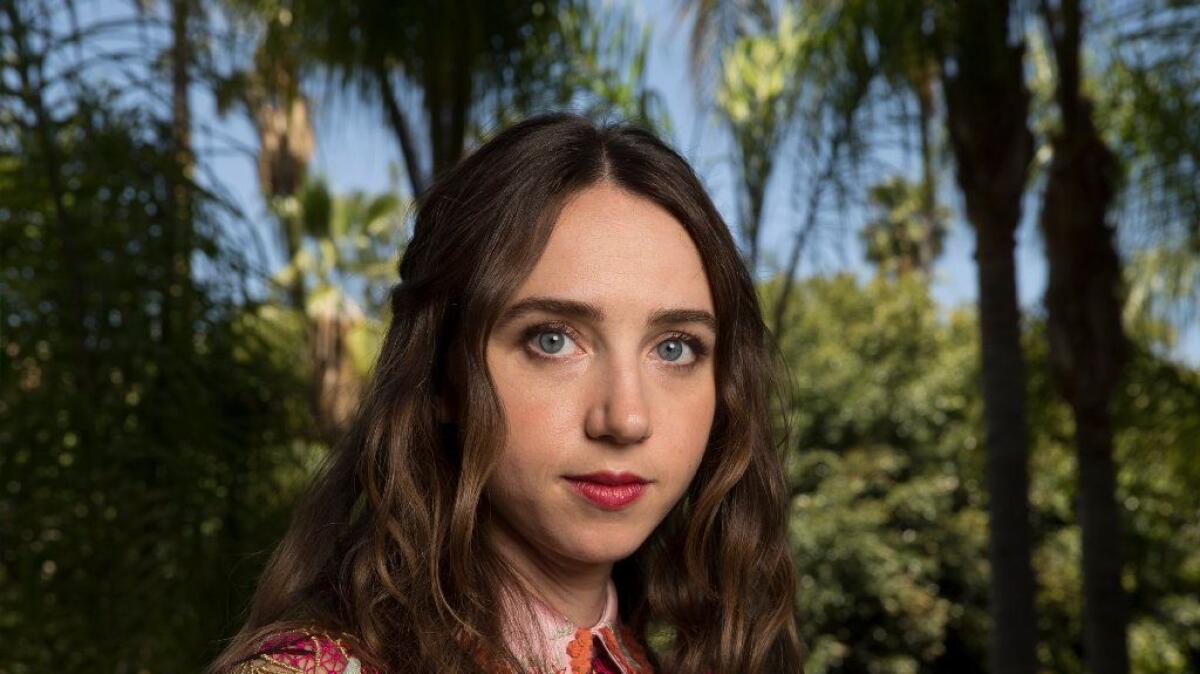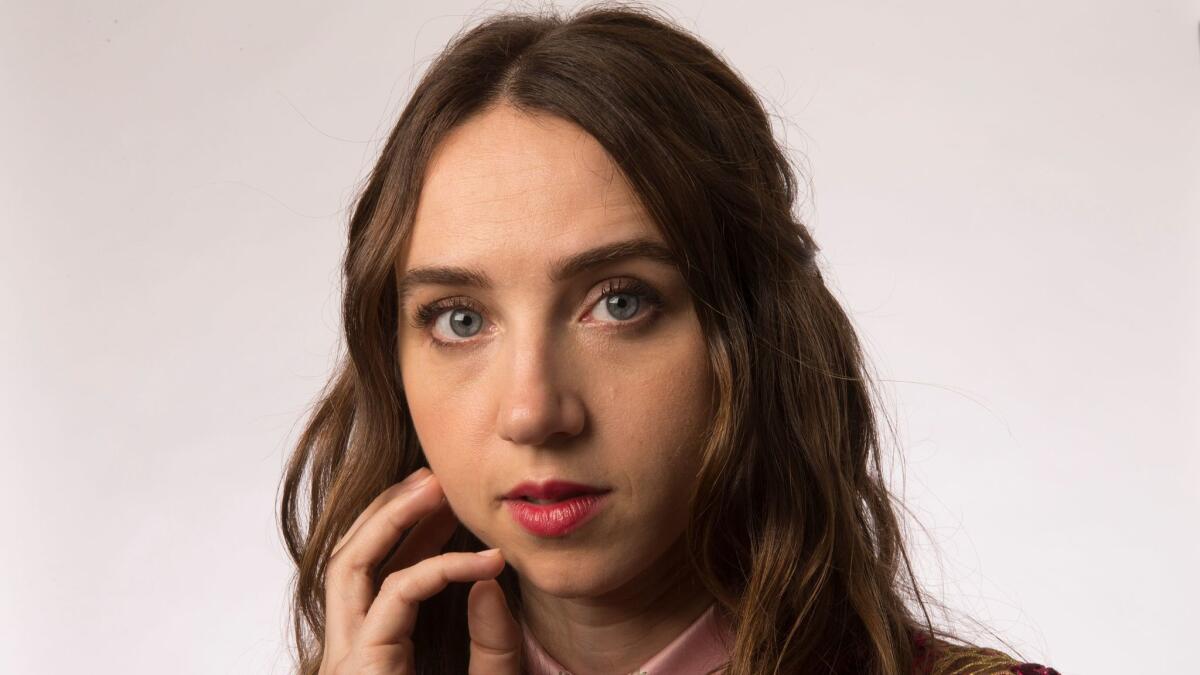Zoe Kazan, an intense intellectual in a Judd Apatow world

- Share via
Reporting from NEW YORK — When Zoe Kazan was in high school, she spent her time on a not-exactly quintessential teenage pastime: reading Harold Bloom.
One day she discovered a preferred volume was missing, borrowed by Barry Mendel, Judd Apatow’s frequent producing partner.
“I think it was my copy that I had given to my mother, who had given it to her friend Barry,” Kazan recalled. “I was upset — it was a book about Shakespeare and one of my favorites.”
When she saw Mendel nearly 15 years later, at an audition for the new film “The Big Sick,” she tweaked him. “Like ‘where’s the Bloom book?’ He never gave it back.”
(Mendel remembers it differently: “I had given it back. It just took a really long time.”)
A comfort with both Hollywood and academia coexist in Kazan, whose emergence as a film force is at once as inevitable as an Elizabethan tragedy and as surprising as a rhyming couplet.
The scion of cinema royalty — she’s the offspring of two Oscar-nominated screenwriters, Nicholas Kazan and Robin Swicord, and her grandfather is that Kazan — the Santa Monica native hardly took a leap by becoming an actress. Kazan landed her first movie role at 19, spent her 20s in more than a dozen indie productions and ended the decade with an Emmy-nominated turn as anxious naif Denise Thibodeau in HBO’s “Olive Kitteridge.”
Now 33, she has a breakout part opposite Kumail Nanjiani in “Sick,” which had a spectacular limited opening this weekend and is shaping up as the counterprogramming hit of the summer. Produced by Apatow and Mendel, and directed by Michael Showalter, the romantic dramedy (and Nanjiani semi-autobiography) centers on a struggling Pakistani American stand-up who falls for fellow Chicagoan Emily, only to run into familial resistance (his) and a serious illness (hers). Kazan plays the part with a sweet-but-never-sentimental vibe, managing to exert a strong pull on the film despite being in a coma for much of it.
But the actress also has climbed the ranks with an eggheadedness that’s rare this side of James Franco. Kazan is the kind of person who not only has devoured Stoppard and Steinbeck — she’s a little surprised if you haven’t.
“I went to the Steinbeck museum and they had his trailer where he wrote ‘Travels with Charley,’” she said. “You read that book, yes? It was everything that fit in that tiny space — his typewriter, where he fried his eggs. I like that idea, of when convenience felt like luxury.”
Kazan was scouring the Cooper Hewitt Smithsonian Design Museum on Manhattan’s Upper East Side, having made the trip from the Brooklyn residence she shares with her longtime partner, the actor Paul Dano. In the fall, Lincoln Center will stage a new play Kazan wrote — a futurist marital drama titled “After the Blast” — and she searched the museum for design ideas.
For several hours Kazan browsed murals, therapy beds, old radios and a host of artifacts. She was trying to suss out how characters in “Blast,” 80 years hence, might similarly memorialize their past.
“I saw an ad on the subway for the museum and I thought it would be interesting to visit — ‘what happens when objects take on totemic power?’”
Moving with academic intensity through several floors, she alternately liked and rejected various pieces. Kazan wore a vintage denim jacket, Chuck Taylors and short flared skirt but not in a carefree manner; it was as though she was trying to jury-rig the appearance of being cavalier more than give natural expression to it.

I’m interested in what looks ‘normal.’
— Zoe Kazan
She stopped and looked at repeating patterns in tree trunks (“like the fractals in ‘Arcadia,’ if you remember,” she said). Passing some throwback décor, she made a comment, as much to herself as to a reporter. “I’m interested in what looks ‘normal.’ A child’s bedroom in the ’90s, the design influence was all Laura Ashley. Now it’s a lot of decals of deconstructed foxes.”
Kazan says she was a lonely child. Her folks bucked the caricature of the overscheduling Westside parent in favor of plenty of unstructured time at home, where she and her sister were encouraged to daydream. (“It was dolls but with no dolls.”) Her friend group at school — Wildwood, Windward, Marlborough — could be limited, owing to her adolescent bookishness.
“Sometimes I was the only person raising my hand in class. I would almost get upset at everyone — like ‘why don’t you care more?’” she said. “It became very important to me to be loved by teachers.”
(Incidentally, she said being the granddaughter of Elia Kazan, who died just after her 20th birthday, didn’t heavily influence her path, though she admits that having actors and filmmakers around — “brushes,” she says, with the likes of Karl Malden and Teresa Wright — had its advantages.)
Kazan’s social blossoming happened at Yale, where she found common ground with like-minded text nerds. “I remember the first time I met Zoe,” said New York theater director Lila Neugebauer, a classmate and close friend who will direct “After the Blast.” “Even at 20, nothing was trivial; nothing was surface. There was a kind of underlying gravity.”
Said Kazan: “I’m a very serious person. Unfortunately, sometimes.”
Showalter says that Kazan “does not suffer fools easily.” The point raises uncertainty when cited to her. “I’m trying to understand what Michael means by that. It seems like, what, not an adage, maybe an axiom?”
Ethan Hawke, whose stage directorial effort “Things We Want” ranks among Kazan’s theater credits, noted how her single-mindedness played at the audition. “She came in and just started breaking down this play with all these killer insightful comments,” he said. “I walked out of there thinking ‘this is a very serious human being.’”
Nanjiani says that intensity came through even in an unconscious state.
“Those scenes in the hospital where Emily is hooked up to all these wires — we had Zoe hooked up to all these real machines on the set,” he recalled in a phone interview. “And I’d come in to the hospital room and do the scene, and on the monitor I could see her heartbeat going up. And I thought, ‘You’re like a biologically good actress.’”
Kazan said she’s trying to slow down after more than a decade of trying out for a lot (Trivial Pursuit question waiting to happen: she auditioned for “Gossip Girl”) and accepting too much. “I don’t want,” she said, “to do every independent film offered to me. I’ve come to a point in my life when my time is better spent writing. Or reading a novel.”
The actress is actually going against type in “Sick,” playing Emily with a breezy cheer that confounds the more studied neediness of many of her previous parts. Exhibit A of those roles: a few guises she inhabits in the 2012 conceptual romantic drama “Ruby Sparks,” which she also wrote.
Kazan is collaborating with Dano again on “Wildlife,” an adaptation of the early Richard Ford novel about a family crisis, currently in postproduction, that will mark the actor’s directing debut. (Dano declined to be interviewed for this story.)
Needless to say, “Wildlife” is far from Kazan’s only hyphenate activity freighted with seriousness. That weight hangs over her other work — “After the Blast” centers on a depressed female character that Kazan says was informed by her own battle with the disease — and, in a way, over her.
“Paul and I went to the Thomas Edison museum recently — have you been there?” she said. “The way Edison was problem-solving required a kind of obsession. He had a cot in his lab because he slept there so often.
“I don’t have a lot of patience for people who want to clock out,” she continued, then contemplated the toll that could take.
“That moment in ‘Broadcast News’ where Holly Hunter is told how great it is to be the smartest person in the room and she cries and says it’s awful — I definitely have moments like that sometimes, moments when introspection and drive can be lonely-making,” she said. “And it doesn’t help that I have a partner who is very work-oriented. Sometimes we’re two hamsters on a wheel.”
She added: “It’s a little embarrassing to feel so serious about work and the world. It makes you vulnerable. I think it’s cool to take the posture of ‘I don’t care’ or ‘I didn’t try that hard.’ It’s a more protective way of being.”
Kazan paused. “There’s something really earnest inside me all the time. It’s not a cool or fun way to be. Sometimes I would like to experience being someone who’s not wired the way I’m wired.”
See the most-read stories in Entertainment this hour »
Twitter: @ZeitchikLAT
More to Read
Only good movies
Get the Indie Focus newsletter, Mark Olsen's weekly guide to the world of cinema.
You may occasionally receive promotional content from the Los Angeles Times.










